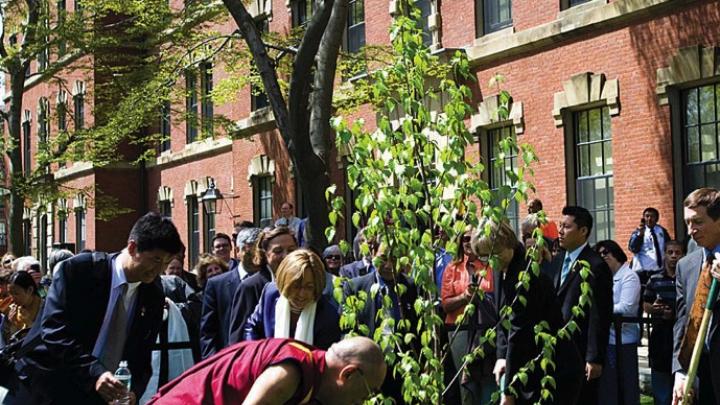Bicontinental Tree
His Holiness the Dalai Lama spoke about “Educating the Heart” to a capacity crowd in Memorial Church on April 30. A central theme was the Buddhist virtue of compassion, even for those considered “your so-called enemy.” Following the talk, which was presented by the Harvard Divinity School and the Harvard Graduate School of Education, the Dalai Lama joined those schools’ deans, William A. Graham (right) and Kathleen McCartney (left), and President Drew Faust in the symbolic planting of a tree, an Arnold Arboretum-bred hybrid of a monarch birch from Asia and a paper birch from North America. For a full account, as well as a video recording, see http://harvardmagazine.com/dalai-lama.
Policing Policies
The “Committee Report on Improved University Policing Efforts,” produced in response to a charge from President Drew Faust last August, was issued on April 24. Having investigated three incidents in which race was alleged to have influenced Harvard University Police Department (HUPD) officers’ responses, the committee concluded that the department “plays a critical role in achieving” University goals of offering “extraordinary freedom and tolerance” for a highly diverse community, “but succeeds only with the guidance, cooperation, and participation” of that wider community. The committee found that the police and members of the Harvard community need to understand and fulfill “both their individual and joint responsibilities,” whether officers are responding to a summons for help or initiating action as part of their community-policing role to assure safety, security, and openness. “University police officers serve, at different times, as advisers, counselors, quasi-parents, or protectors in their interactions with students, many of whom are still in their formative years and, on occasion, make errors of judgment to varying degrees,” the committee noted. It recommended creating an advisory committee of students, faculty, and administrators; adoption of an “account-management” structure for police liaisons to the community; an expanded role for the diversity and community liaison officer; an external public-safety ombudsman; and a variety of efforts to enhance communications and personal interactions. The complete report is available at www.news.harvard.edu/press/pressdoc/090424_hupd_report.pdf.

George Simian
Martha Minow
Law Leader
President Drew Faust announced on June 11 that Smith professor of law Martha Minow will become dean of Harvard Law School on July 1. She succeeds Elena Kagan, who is now solicitor general of the United States; Reid professor of law Howell Jackson has been acting dean in the interim. Minow, whose scholarly interests range from human rights to family law, co-led the school’s recent curriculum revision. We reported Minow's appointment on our website June 11.
Admissions Anguish
The competition to gain entry to elite colleges only intensified this spring. Harvard College announced that 29,112 students applied this year, up from 27,462 in 2008. Offers of admission were made to 2,046—just 7 percent of applicants, down from 7.9 percent the year before. (At Yale, the admit rate declined from 8.3 percent to 7.5 percent.) Given recent changes in financial aid, the economic environment, and schools’ differing policies on early admission, the College expected to take a significant number of students off the waiting list, as it did in 2008.
Summing Up Swine Flu
In late April and early May, as concern rose about the spread of H1N1 influenza (swine flu)—and as Harvard School of Dental Medicine suspended classes and clinical activities, following an outbreak of nine possible cases of the illness at the school—provost Steven Hyman and University Health Services director David Rosenthal e-mailed alerts and updates to the community. Among the sources of information to which they pointed were the Centers for Disease Control and Prevention and World Health Organization websites. (Not mentioned was the medical school’s Harvard Health Publications affiliate, where a report on “Swine Flu: How to understand your risk and protect your health” was quickly on offer—for sale, for $18.) Separately, at the Faculty of Arts and Sciences meeting on May 5, President Drew Faust, who had been under the weather, invoked swine flu in setting a precedent. Conferring honorary master’s degrees on newly tenured professors who lack a Harvard degree (a long tradition), she handed over the diploma but did not shake the recipients’ hands—on the advice, she said, of the dean of the Harvard School of Public Health.
Anthropology Atomized
The Faculty of Arts and Sciences (FAS) has voted to remove the biological anthropology wing from the department of anthropology, effective July 1, and to rechristen it as the new department of human evolutionary biology. Anthropology will retain its social and cultural anthropology experts, and archaeology. The separation was consensual—department members approved it unanimously—and reflected decades of gradual change in subject matter, research methods (human evolutionary biology routinely involves genetics and genomics today, for instance), and administrative overlap between FAS’s social science and science divisions.
Pub’s Progress

The Cambridge Queen’s Head Pub, operated in the basement of Memorial Hall, is now licensed to serve food and beverages on the landing at the western entrance to the building. And so, in these anxiety-ridden times, it celebrated with a “Pub Patio” grand-opening event on April 9, complete with celebrity decanal bartenders on the job.
Nota Bene
Publishing prizes. New York Times art critic Holland Cotter ’70 received the 2009 Pulitzer Prize for criticism. And University president Drew Faust was awarded a 2009 Bancroft Prize—the premier recognition within the profession for works on American history—for This Republic of Suffering: Death and the American Civil War (excerpted in this magazine’s January-February 2008 issue, beginning at page 44).
Advising exit. The College’s first associate dean for advising programs, Monique Rinere, who arrived from Princeton in 2006, is leaving for Columbia. Her Harvard service began at a critical time, as the undergraduate curriculum was revised and students were given the freedom to defer their choice of concentration from the end of freshman year to the middle of their sophomore studies. Separately, the advising office has found a new way to reach students seeking academic counsel: the April advising fair (see “Advising Adventures,” July-August 2007, page 68) had its own Twitter address: twitter.com/Fortnight2009.
The international academy. Columbia University has launched a network of six to eight research centers in capitals worldwide, hoping to engage faculty members and students in international projects with local universities, governments, and other organizations. The first two have been sited in Beijing and Amman, Jordan. Separately, Yale announced a $50-million gift for a global-affairs institute, aimed at preparing students for diplomatic or public-service careers.
A shooting on campus: Justin Cosby, a 21-year-old Cambridge resident, was shot in the basement of Kirkland House J entryway on May 18, and died the following day. Jabrai J. Copney, age 20, of New York, turned himself in to Cambridge police on May 21, and was charged with murder a day later. According to Crimson reports, telephone records linked Cosby to marijuana sales to students on campus.

Stephanie Mitchell/HNO
Venkatesh Narayanamurti

Daniel P. Schrag

Eliza Grinnell/SEAS
Michael P. Brenner
Miscellany. Alumni Affairs and Development has appointed Ed Sevilla to the new position of executive director of strategic communications; he will coordinate communications for the University Development Office, the Harvard Alumni Association, and other units, and direct their enhanced digital-communications efforts.…Armstrong professor of engineering and applied sciences and professor of physics Venkatesh Narayanamurti, past dean of the School of Engineering and Applied Sciences (SEAS), has assumed the directorship of the Harvard Kennedy School’s science, technology, and public policy program (http://belfercenter.ksg.harvard.edu/index.html). During a sabbatical year, he has been at work on a new undergraduate course, to be called “Introduction to Technology and Society.”…After 21 months of interim service, Thomas R. Jehn has been appointed Sosland director of the Harvard College Writing Program, which is responsible for the required expository writing course and support for student writing and faculty instruction in the craft.…The Arcadia Fund, established by Lisbet Rausing, Ph.D. ’93, and Peter Baldwin, Ph.D. ’86, already an important supporter for the Harvard University Library’s online open collections program, has given the library a $5-million, five-year grant for flexible support for acquisitions, access, and preservation.…Hooper professor of geology and professor of environmental science and engineering Daniel P. Schrag, director of the University’s Center for the Environment, has been appointed a member of President Obama’s Council of Advisors on Science and Technology. See “Fueling Our Future,” May-June 2006, page 40, for coverage of his research.…Glover professor of applied mathematics and applied physics Michael P. Brenner has been appointed the first associate dean for applied mathematics within SEAS.…Harvard Medical School has launched www.harvardprostateknowledge.org, an online resource on prostate cancer, related conditions, and treatment options.…Boylston professor of rhetoric and oratory Jorie Graham, a poet (see “Image and the Arc of Feeling,” January-February 2001, page 39), has been elected a member of the American Academy of Arts and Letters.








